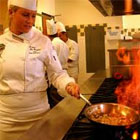I spent the five happiest years of my life in a morgue. As a forensic scientist in the Cleveland coroner’s office I analyzed gunshot residue on hands and clothing, hairs, fibers, paint, glass, DNA, blood and many other forms of trace evidence, as well as crime scenes. Now I'm a certified latent print examiner and CSI for a police department in Florida. I also write a series of forensic suspense novels, turning the day job into fiction. My books have been translated into six languages.
As I'm not trained in digital forensics, I'm afraid I wouldn't know. PS the purpose of this website is not really so that you can cut and paste your homework and get other people to do it for you.
Yes. It's not common, but prints have been lifted using superglue or the more recent RTX. The best areas would be those that are smooth, clean and largely free of hair.
The vast, vast majority of people who kill people didn't plan to kill someone, so they often leave fingerprints, blood, witnesses, text messages, and then come up with some sort of story that sounded good in their head but wouldn't fool a 6 year old.
Gunshot is the most common, then bludgeoning, then stabbing.
Chef
 Do you get offended when a customer sends back a dish?
Do you get offended when a customer sends back a dish?
Starbucks Barista
 Why does Starbucks attract so many homeless people?
Why does Starbucks attract so many homeless people?
Inner City English Teacher
 Are you pressured by administrators to pass kids that aren't ready yet?
Are you pressured by administrators to pass kids that aren't ready yet?
That depends on what you want to do. Call labs that you're interested in working for or peruse job opportunities postings at the major forensic organizations websites and see what they require.
Titles and job requirements aren't uniform, so the only way to know is to call the crime labs in your area or wherever you might be interested in working and ask them. At the coroner's office we had to have at least a bachelor's in a natural science (this was before they had forensic science majors). At the police department where I am now, they only require a high school diploma but you get more points in the interviewing process for having a four year degree, so we all have one. You can also go on the websites for professional organizations such as the American Academy of Forensic Sciences and check out their job vacancy postings and see what the various positions require. Good luck.
Gunshot residue can actually refer to two things, gunpowder that flies out of the barrel with the bullet and can land on the victim, and primer residue that can leak out of the back of the bullet cartridge and spray out onto the shooter's hand. But it can also get on the gun or nearby surfaces or people so presence of it on hands does not prove someone fired a gun, and it can wipe off easily so absence of it doesn't prove they did.
-OR-
 Login with Facebook
Login with Facebook (max 20 characters - letters, numbers, and underscores only. Note that your username is private, and you have the option to choose an alias when asking questions or hosting a Q&A.)
(A valid e-mail address is required. Your e-mail will not be shared with anyone.)
(min 5 characters)
By checking this box, you acknowledge that you have read and agree to Jobstr.com’s Terms and Privacy Policy.
-OR-
 Register with Facebook
Register with Facebook(Don't worry: you'll be able to choose an alias when asking questions or hosting a Q&A.)